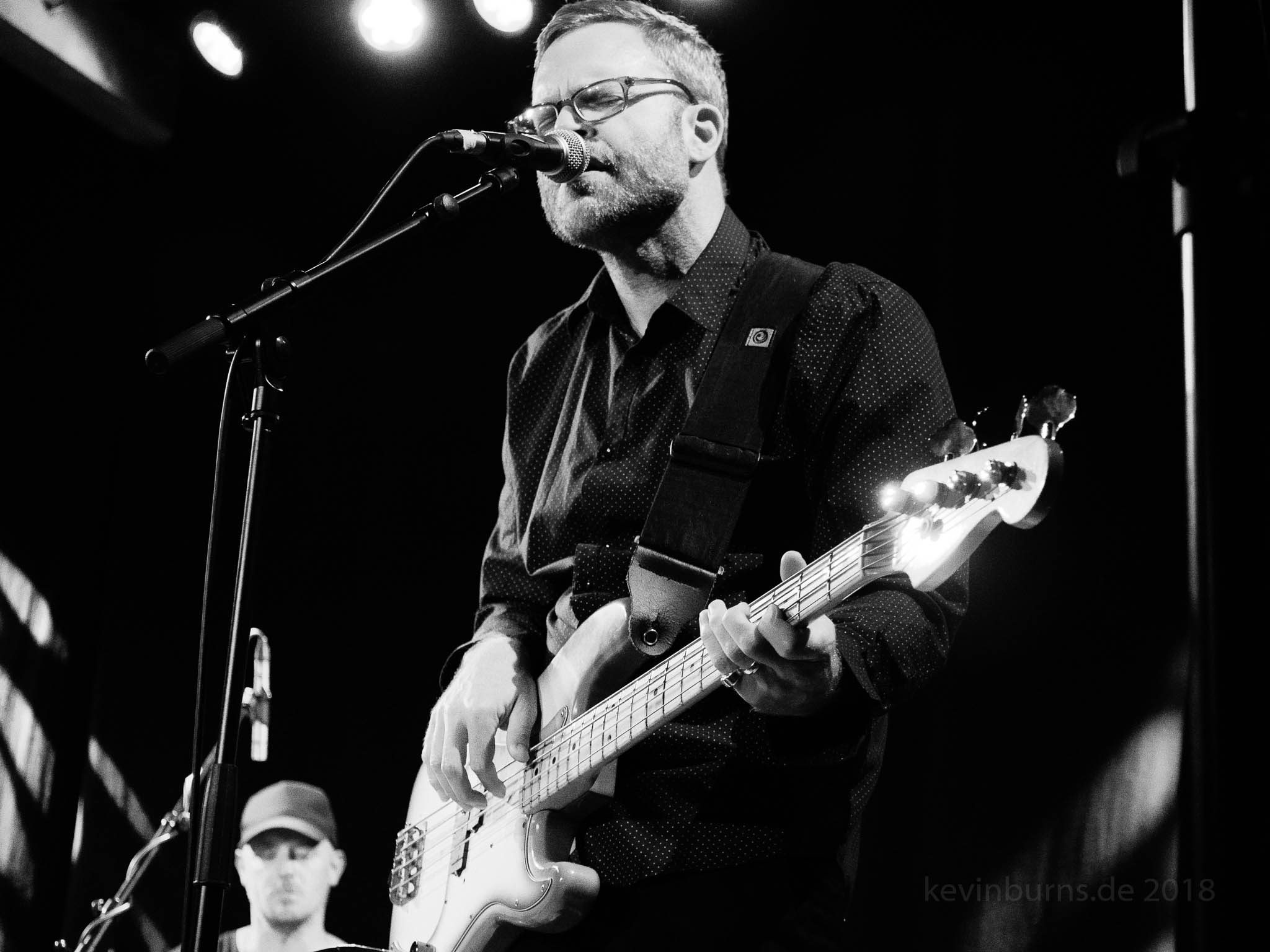Josh Haden’s band Spain has had a long and winding career. Throughout the band’s existence their output of six studio albums, however, has had a consistent level of high quality. Their music is among the critics’ favourites, the fans are faithful. Deservedly so, as Spain is a band that offers genuine and heartfelt and well-crafted songs that never bow to trends, never try to endear themselves to the business and above all remain absolutely timeless. It is always mentioned that Josh Haden is the son of jazz legend Charlie Haden. Yes, Josh has immense musical pedigree, also on his mother’s side, even down to his grandparents and his triplet sisters Petra, Tanya and Rachel hypnotise with their own musical project The Haden Triplets. He also has talent, of course, and/or a gift for music. But more than three decades playing and honing his craft, he can by now, I think, maybe, also express it like this: Charlie Haden was the father of Josh Haden. I felt very honoured that Josh took the time for this: Spain’s Josh Haden – an interview.
Spain have just released their sixth album “Mandala Brush” on Glitterhouse Records/Dangerbird and I am looking forward a lot to have still hours of listening pleasure ahead of me as there is much to explore on their new oeuvre again. During the release, Spain were already on tour in Europe and you can still catch them in Germany, Denmark, France and Italy. I had never before seen Spain live and when they started off their set at Eupen’s Alter Schlachthof (thank you, all the lovely people at this wonderful venue and also Chris as tour manager and Judith for your help), it went like this:
The bottles of Eupener beer came in handy and were used for making hooting sounds that were repeated by the instruments, came and went and changed and it went all experimental and free jazzy and to my utmost astonishment, very magical, warm and above all inclusive and humorous and not a bit self-indulgent. Turns out to be a rendition of “(Korean letters) God Is Love” from their new album. At this point let me tell you who is on tour with Josh Haden: His sister Petra Haden on vocals and violin (simply wow, the violin playing and that voice, especially in the encore, the very famous “Spiritual” – I noticed, almost blue in the face, that I had been holding my breath and that there were tears trickling down my face), the versatile and expert and straightout great peformers Kenny Lyon on guitar (and melodion?), Shon Sullivan on acoustic guitar and keys and Jakob Hoyer on drums. Spain continued with a couple of renderings of their new album “Mandala Brush”, a bit of banter, especially on Mr. Trump (much more of that later in the interview), and many perfectly rendered classics from the older albums. Just go and see them live, for goodness’ sake, and be bewitched. After a French venue did so and Josh really appreciating it, he has ever since labelled Spain’s music as indie, americana, slowcore, free jazz (I think) for those of you who would like to place them somewhere. Well, Spain’s Spain and that’s more than good enough.
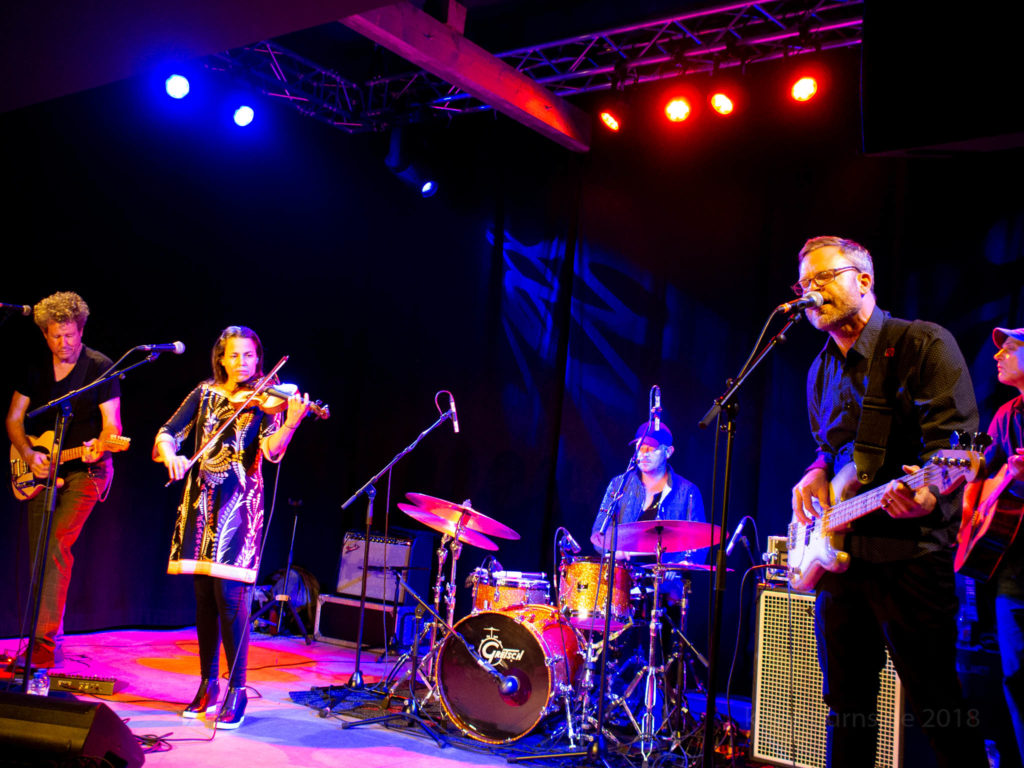
Now make way for Josh Haden. Well, and yes, I am almost interested how musicians or artists in general feel in the U.S. these days and Josh went for it. But other than that, lend him an ear when he talks about his new album, the music industry and a lot more right now in his own words:
Offbeat Music Blog: Thank you very much for taking the time, Josh!
Josh Haden: Thanks for having me!
OMB: Your band Spain is gracing Eupen tonight with a rare concert on the release of your new album “Mandala Brush”. I would like to go back in time a bit. You come from a musical family – it couldn’t get any more musical. Your sister Petra Haden is with you on tour, you have to more sisters who are musicians, your father was a famous musician and your mother is one too. Was there any point in your life and even if was out of sheer teenage rebellion where you said: “I am not going to be a musician”?
Josh: Well, not really. I have always been interested in music and I grew up with musicians, so it seemed pretty natural. But I also like reading books. I grew up with lots of books around and I also wanted to be a writer and I am still working on that. But so far the music takes up all my time.
OMB: There has been a point in your career, not a loss of interest in music from your side but hassle with the music industry, let’s put it this way. I read somewhere, it not only almost destroyed your livelihood but you did not find the energy to play. Is that true and how did you overcome that?
Josh: Well, this was a long time ago and I was much younger and I think I had a little bit too much pride and not enough willingness to compromise. I said to myself, if I cannot do it my way, I am not going to do it. I took a little time off and went to a school for writing. I wasn’t really happy there. Then this rap producer Dan The Automator contacted me and asked me if I wanted him to produce my record because I stilled owed a record to this company called Dreamworks that doesn’t exist anymore. That’s when I got back into music. It was really just a few years I did not do much music. Spain, the band, were the project I did put on hiatus for quite a few years. In ended that in 2001 and did not start again until 2008. The first record of the reboot, I guess you can call it, was not until 2010. So that was quite a few years.
OMB: Did you, during that time, look for musicians who would share the same goals, the same vision?
Josh: I would never be that lucky. It was a matter of musicians who could play well and had understood what I was trying to do and who were of the musician’s mindset…not every musician can tour. Not every musician has the personality that allows them to tour. Also money, having the budget for it…I am never out of ideas but I am constantly out of money. Money is usually the biggest hurdle preventing something from being released and being able to properly promote it and tour for it. So, musicians, you know, that’s always a process. There is nothing complicated about it. It is just finding the right people. Sometimes you think you found the right person but it turns out you didn’t and you have to find someone else. Not that there is anything wrong with that musician but it might not work in that particular project. That’s a process.
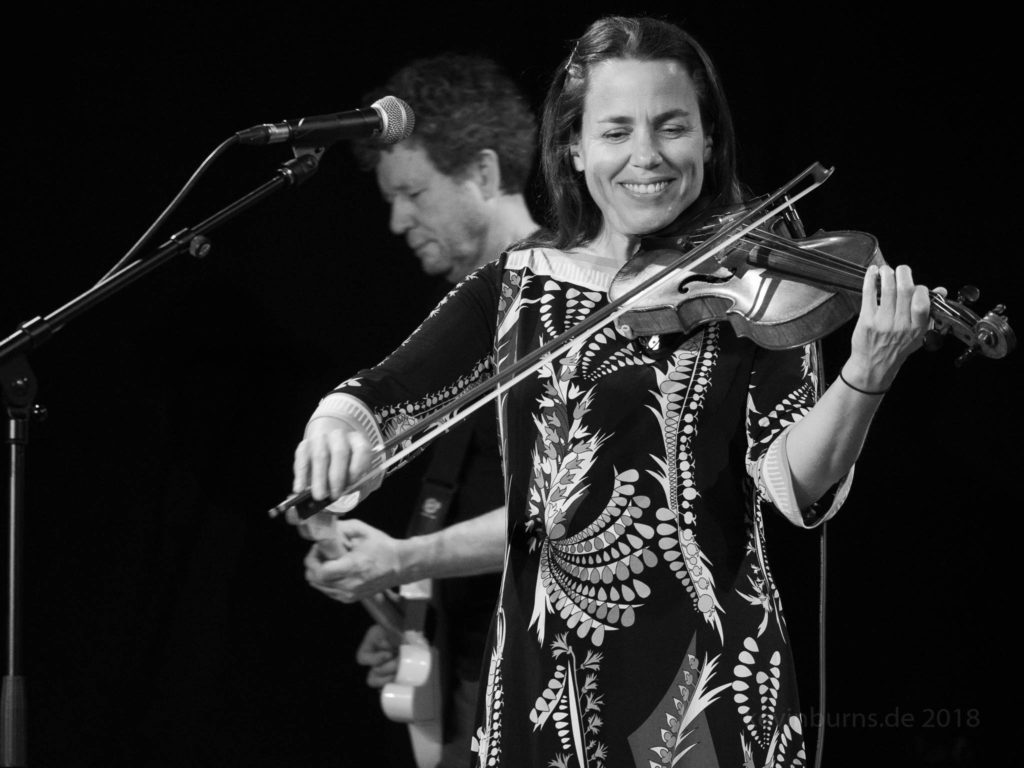 OMB: You are from California, a fairly liberal and progressive state. How do find it, living in the US at the moment?
OMB: You are from California, a fairly liberal and progressive state. How do find it, living in the US at the moment?
Josh: Well, that could take a long time to answer. It is really worth everybody asking themselves that and give their own answer. I am me and I think to myself: How could anybody support dictators? Or people who aspire to be dictators? I ask myself that. Of course I don’t support politicians like that but there are people who do. There are quite a few and they have to ask themselves these questions too. It’s not just happening in the States – it is happening in Europe too. So, young people don’t get very good educations, they are not properly reminded of the lessons of World War II. You have people in America who really, really think that the Nazis should have won World War II and that’s the Trump supporters. Then you have people in Italy who feel the same way. What Trump wants…I don’t know if it’s Trump but definitely his supporters and people in his administration, when they say they want to turn the clock back to a better time, make America great again, what they are saying is, they want to turn the clock back to before World War II. They want to be in a place where there can be a dictatorship that runs the world. They feel if they don’t achieve that, it’s going to be “kaputt” for the world. It’s a consolidation of power because Conservatives believe, even though they say they don’t believe this, that global warming is going to shut the world down and the people who have the money and the resources are going to be the survivors. They are acting out of a survival instinct, at least in their mind. And if you are reading interviews with them, this is what they say, I am not making it up. Trump, ha, Trump, I am not sure, if he is intelligent enough to think about it in these terms. He’s like Hilary Clinton. I am not against Hilary Clinton. I support Hilary Clinton. He is like the kind of politician who will change his views. If he sees that the tide is turning in a certain direction, he will change his views. But a lot of his supporters like, Stephen Miller, I think his name is – that guy is scary. He’s like Himmler basically. And the guy John Bolton – this is just my opinion – but John Bolton who is now Secretary of State or something, I don’t even remember anymore, that guy is really scary. He scares me more than Trump does because he is sitting next to Trump and tells him what to do. (Sighs).
OMB: Like a puppet on a string…
Josh: He would not call himself that.
OMB: Of course not.
Josh: It’s possible. But you know, I really do think that…I am a musician and make living making music and recording and writing songs and trying to communicate stuff that I am thinking about in song and writing poetry and stories and putting them to music and touring and playing concerts and bringing that music to people, so I am on a different kind of thinking playing field. I wish that all kids, teenagers probably…every single teenager in the world including the Middle East and Eastern Europe and Africa and Antarctica, that they are required to either to tour as a musician or tour as a roadie or something that gets them out of their hometown and to see the world. Usually when people tour they have a perspective on other human beings and how other human beings live that they won’t get if they stay at home and just watch TV and listen to their conservative parents. Hopefully they won’t have conservative parents. I think there would be a lot of a different kind of atmosphere if every kid could have an experience like that. But you know, I tour and I don’t have to think about Trump and what’s going on. I get notices on my phone like everyone else and usually I am fine. But today, just an hour ago, I got this notice from The New York Times and it says: The US moves hundreds of migrant children to a desert tent facility in Texas in the middle of the night with no education and no access to lawyers. And that’s like…How can anyone support Trump for doing that? For not speaking out against that and saying: This is wrong. And that’s depressing. And then I think about my son and how would my son feel if he was taken from me? And I could just picture that and here’s hundreds of kids going through that. All kids are the same.
OMB: To some they are not. They are being dehumanised.
Josh: Exactly. They are doing that on purpose and this is going back to what Republicans want to do. The Republicans in the United States want to get rid of labour unions. If they get rid of labour unions, the next they want to do is to cut the employment age for children and they want children back in factories working for pennies. That’s completely what they want. That’s why we have cheap Apple products and cheap clothing because there are seven-year old, eight or nine-year old kids in Thailand or Indonesia and China working in sweatshops. We have laws against that in the States. The reason why is because of labour unions, because of socialism. This is another reason they are trying to consolidate power. They see the world is going to end, at least they think it is, and when overpopulation and global warming destroys half of the planet and half of the planet is habitable, we are going to be the survivors. That’s what they are saying and if we have seven-year old kids working in factories and putting stuff together and we don’t have to pay them anything, we are going to make even more money. That’s what they want. (Laughs bitterly).
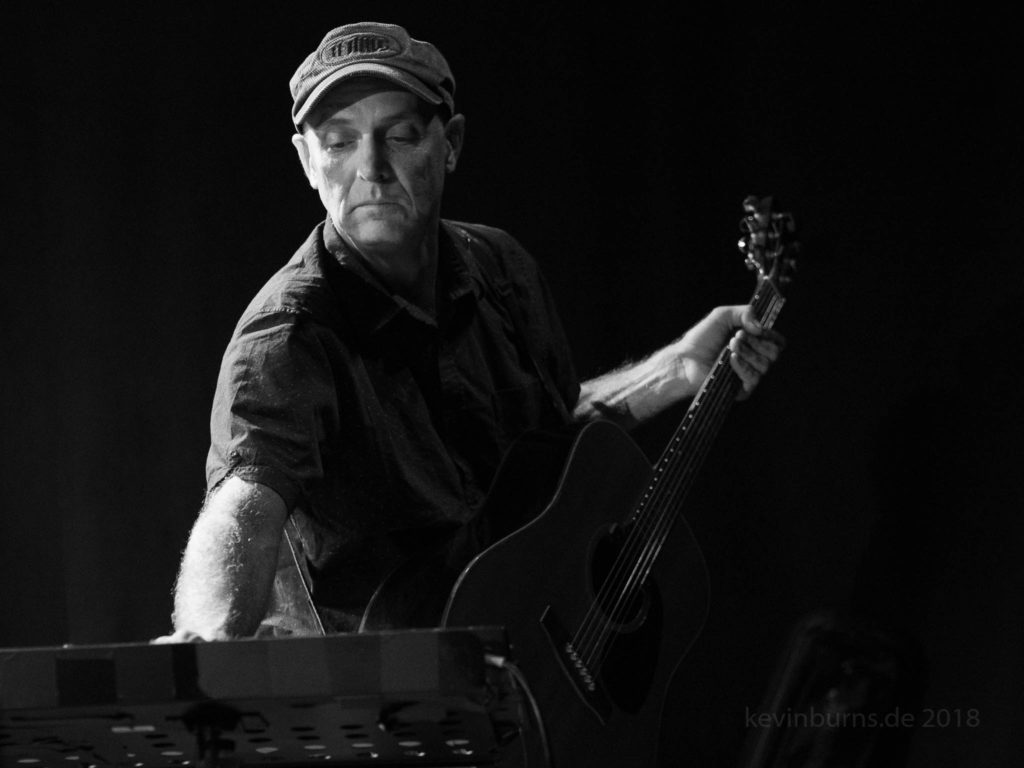 OMB: As a musician, what has been the impact for artists? In what terms do you see the Arts being infringed, financially or culturally?
OMB: As a musician, what has been the impact for artists? In what terms do you see the Arts being infringed, financially or culturally?
Josh: I would not say financially for me but the Arts in general, yeah, because there is less funding. A lot of times when we are in Europe we are playing in venues that are partially or entirely supported by the government. We don’t have that in the States. There is support for the Arts but with Trump in office it gets less. They give less money to the Arts because “why should we support the Arts? The Arts is critical of us. Why should we support something that is criticising us?” That’s what they think. Also, the religious Conservatives which is another big issue, they don’t want the Arts because the Arts are from Satan (laughs). That’s what they think. For me the biggest financial hit is from streaming music. But that’s just a reality. That’s got nothing to do with Trump. There was just a law passed in the States that ensures that musical artists will make more royalties from streaming services but I don’t really know.
OMB: On the one hand modern technology has been good for music artists as they can make their music, promote their music, get it all over the place without the big music industry. But on the other hand, someone is making money on the music and it is not them. That is not referring to say Bandcamp, but, er, the other big one.
Josh: Well, you know, it’s a racket. Music business was started by gangsters and the mafia and if a lot of money can be made with something, there is going to be graft and corruption. It is the same thing with streaming, only, instead of Warner Brothers, Columbia and Universal making all the money, it is Spotify and what are the other ones called…
OMB: Deezer?
Josh: Sound Exchange, the company that collects the money for Spotify streaming, in the States at least. It’s people who say, yeah, we can make a lot of money off artists. What could be better than this? We are making all the money. All we need to do is a little bit of coding. We have coders working for us and they can do the dirty work once we fix it up and then we make billions of dollars and we can go on vacation to Tahiti whenever we want. They are saying probably, the artists are screwed anyway. Artists are already happy working for peanuts. Let them be happy. That’s what they think. I guess to a certain extent they are right. I am happy working for peanuts because I don’t care about money. I am not doing this for money and …
OMB: Yeah but nobody else should be earning money on your music either.
Josh: But that’s the problem because if I worry about that, then I don’t want to make music. I don’t want to sit down and make music. I have my son. My time is already limited enough. When I am home, I only have a few hours a day when I can work on stuff. I don’t really think about it – too much. I have this list of things I need to address. With money that’s owed to me…
OMB: Then again everyone feels compelled to be on Spotify because it gets you publicity…I don’t have Spotify…
Josh: I like Spotify. I don’t support them but I like Spotify, the app. What I listen to on Spotify a lot is the new jazz releases. The technology does not bother me. It is just the …
OMB: The business behind it?
Josh: The business behind it. The disregard for artists. The attitude of the people who run Spotify and other streaming services. I have talked to them personally and I have had arguments with them and email exchanges and I am always right. And there are always wrong. But what can you do? They have got the power.
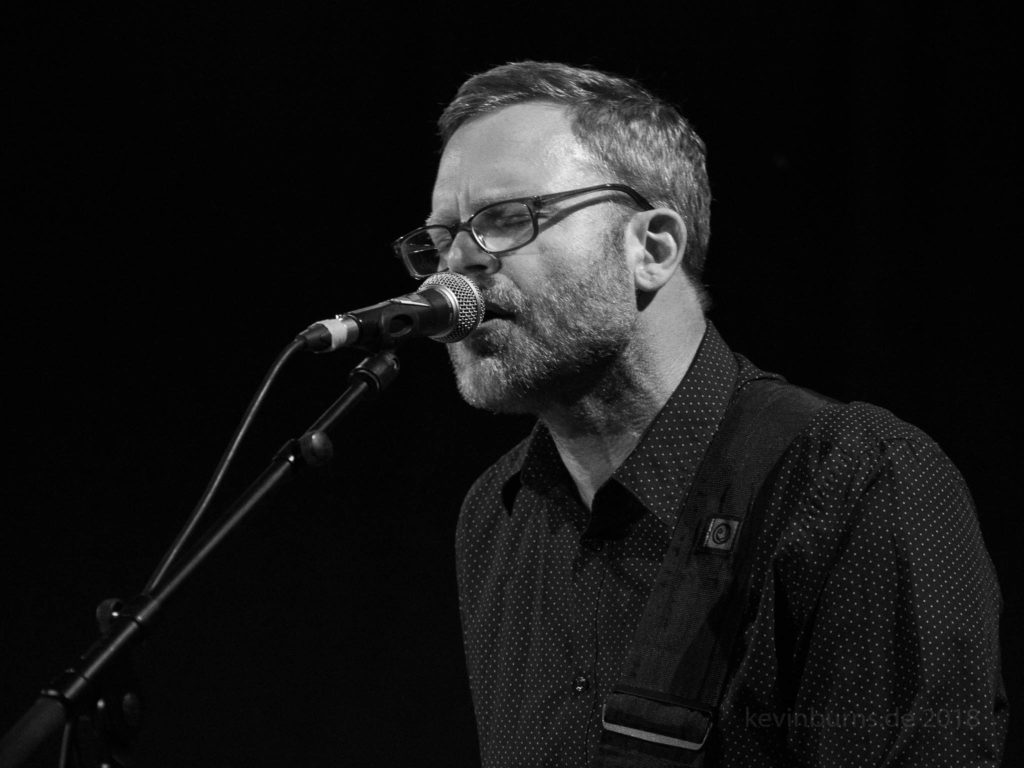
OMB: Your albums seemed well thought out. I would not go as far as call them concept albums but do you sit down and think about the album, what kind of atmosphere it should have and which song should go and which not, and a particular order to the songs? The albums seems so much in one piece. Some artists go as far as to think in A-sides and B-sides even. I don’t know, do you plan an album to be like that?
Josh: No. No, the closest I would come to this, is maybe having an idea for the artwork like for “The Blue Moods of Spain”, our first album. I really had a vision for the front cover. I worked on it really hard. I practised with a different photographer for a 7” that we put out in 1994 that was kind of a prototype for this “Blue Moods” cover. I worked on that very much and for it to come out the way it did, that took like a couple of years of work. But as far as the songs or the concept behind it…that was very much a collaboration between me and the producer. It’s not something I sketch out beforehand. Like, what songs do I have, what songs are the best ones? How do we narrow the best ones down. Then I might like a song that doesn’t really work for some reason. So, what songs work and what songs actually sound good once we record them? And you narrow it down like that. At least that’s how I work. For the new album…that’s another thing like: I have the songs but what’s the title going to be, what’s the artwork going to be? That comes just by messing around and doing research and thinking and looking at random things that come into my life. Choosing it, grabbing it and “okay, this works”. There are aesthetics to it but I am not strict about them. I like it to be permeable and – I don’t know what the word is – and…what’s the word…spontaneous!
OMB: That is probably better for the listener to start owning a song too. If something is left more open, a listener can feel addressed more and go, that’s me who he is talking about or I feel touched by that kind of instrumentation.
Josh: It can come either way. There are groups like Bon Ever who I really love, his lyrics, you have no idea what he is talking about. It’s poetry, definitely. They are lyrics and they are beautiful, but I have no idea what he is talking about! But then a word will come up in a certain part and I get, you know. So there is that kind of style and another style is Mark Kozelek who I toured with last year and listening to his lyrics which are very easy to understand and are super personal. Basically what he does is, he keeps a diary and he puts his diary entries to music. He talks about things that happened to him in his life in a very specific way but at the same time people love it because they can relate to it. Even though they did not have that exact same experience, it affects them. He is talking about the things he has learned from his life and it is the same kind of thing that everyone learns who lives long enough. That’s why people connect with his songs. That was really cool I thought.
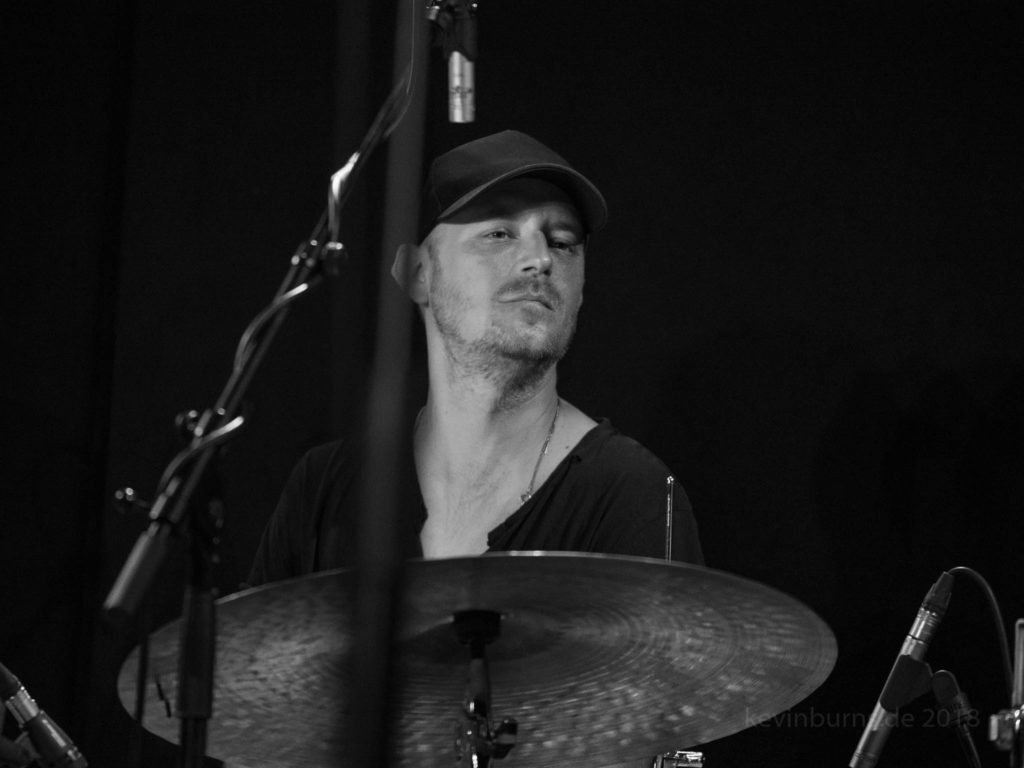 OMB: You have come to the point where on your albums your lyrics have become more personal. On your last album “Carolina” you were connecting experiences of your family with bigger historical events or these events filtered through the eyes of your family. Did you want to do something similar on your new album “Mandala Brush” or did you attempt something totally different again?
OMB: You have come to the point where on your albums your lyrics have become more personal. On your last album “Carolina” you were connecting experiences of your family with bigger historical events or these events filtered through the eyes of your family. Did you want to do something similar on your new album “Mandala Brush” or did you attempt something totally different again?
Josh: Again I don’t really know. I don’t question myself how to create things or why. I just do it how I feel. I do have a basic idea which is I don’t want to do what I did on the last album. I want to do this certain thing and let’s see if it works. It might not work, then I have to try something else. “Carolina”, the last Spain record from 2016, and “Sargent Place’” which was from 2014, those two records were much more specific in addressing things that I was going through. The new album is more oblique, I guess, or amorphous. What I am singing about is not as…I could say what a song like “Battle Of Saratoga” from “Carolina” is about you know. The song is about my father. In the 1960s when he was addicted to heroin very badly and he was – this is just something I imagine he might have gone through – getting a gig in upstate New York for Christmas Eve and getting snowed in and not being able to get his heroin because he is in some little tiny town in New York and he can’t get back to the city. I could say that there are a lot of songs on that record and on “Sargent Place” where I wrote about something specific. But on the new album I don’t think there are any songs where I am talking about something specific and detailed. It is more like a feeling or an emotion I wanted to express. Or there is a song on the new album called “Tangerine” which was completely inspired by a movie called “Tangerine”. The song has nothing to do with what the movie is about. It is a beautiful movie called “Tangerine”. It came out maybe five years ago, I think. It is set in my town of Los Angeles and is about these transvestite prostitutes who work Santa Monica boulevard and it is like a Homer odyssian journey of these ladies who go from one part of Santa Monica boulevard to the other. It is such a great movie and it was shot on iPhone which isn’t such a special unique thing anymore. But after watching the director’s comments on the movie, I wrote “Tangerine”, the song. So there is something like that influenced by other art.
OMB: So it is more like a stream of consciousness?
Josh: Yeah, yeah.
OMB: You combine a lot of genres in your music. Sometimes it is hard for people to pin you down. They try Slowcore, whatever that is. I was told it is easier in the US to cross genres than in the UK for instance. Do you find it easier? Do find it easier to collaborate with musicians from other genres and what comes out of it is totally your own?
Josh: I would say I don’t think about genres and maybe that is one of my big problems in getting my music accepted. I don’t care about genres and people in general want genres.
OMB: Or the algorithms want genres.
Josh: Yeah, I don’t worry about that. I write my songs and cross my fingers that someone is going to hear them and listen to them. Even when they don’t want to listen and don’t want to hear and don’t want to care, I am still going to do it…You know, I was watching this show on TV with my son. It is this real estate show where people who are very wealthy show their incredible house. There was this guy, I don’t even remember his name. He is one of this techno guys – I don’t know his name. I was like “who is this?” and my son didn’t even know about him and my son knows a lot about new music. And this guy had a multi-million house in Hollywood hills. He was like 25 years old. Everything about this house was incredible. I googled his name and he is just some kid who makes electronic music. He’s been nominated for Grammys. I don’t pay attention to the Grammies, can’t remember the last time I watched the Grammies. But apparently he has been nominated multiple times. I listened to the music and it is not pleasant. It’s not creative in the sense of musicians getting together and being creative and trying to create something human, being social, being together. Experiencing what it means to be human as we are being human. I don’t know if that makes sense.
OMB: I don’t know. As in music making for the sake of it versus just selling any old stuff? It makes sense to me in that way: Too much money for a young kid and out of something that is out of the tin, no life experience, no nothing. Pretty thankful, my kids listen to different stuff, as yet anyway.
Josh: My personal feeling is, more power to him, I am happy for him.
OMB: Sure, if he is nice enough.
Josh: Exactly, if he is nice enough. If he is a fair and honest person, a good human.
OMB: Back to the genres… I don’t like tagging genres to my shows because I compile them according to how I feel and according to connections between the songs and they could contain any genre as long as there is a flow, a thread.
Josh: Yes, exactly.
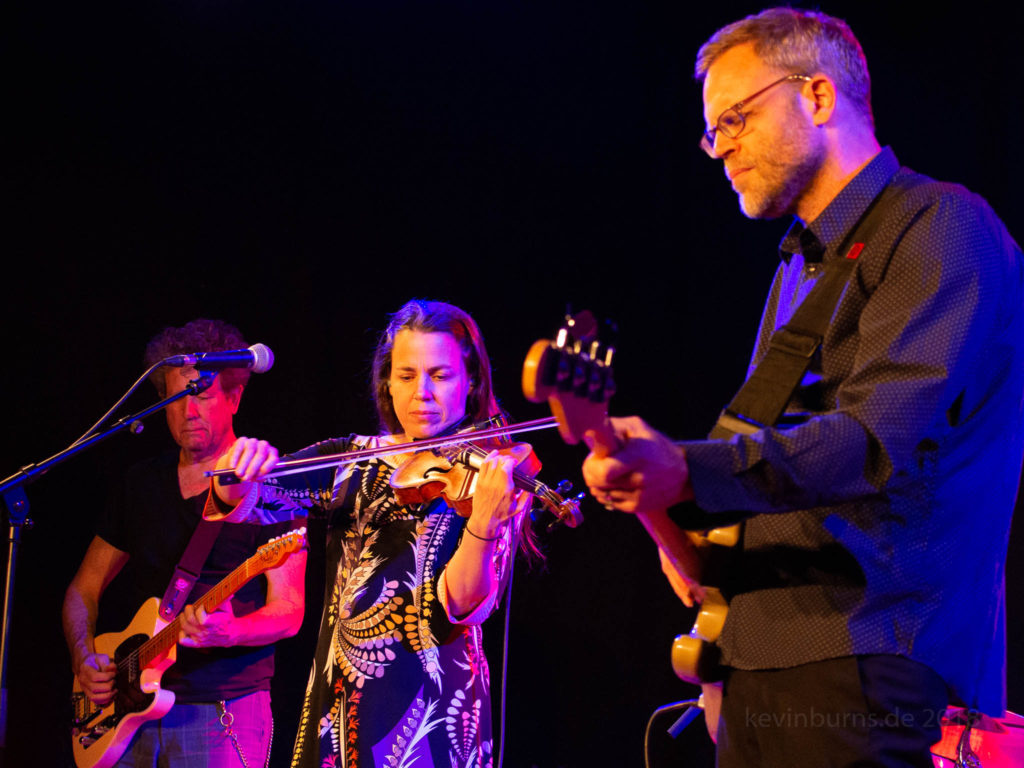
OMB: Your new album “Mandala Brush”, there was one particular aim for it: You wanted it to be like a live recording, no fidgeting in the studio with the songs?
Josh: The idea came to me, even though it is not a very unique idea, when we finished touring for “Carolina” in 2016. My manager at the time wanted me to go right back on the road in the States. We don’t really have a lot of support in the States and I need to tour more there. I was like, you know, you know, er, … (Josh distracted because his sister Petra is checking whether is finally finished and he is making signs for her not to come in, poor Petra and Josh’s poor dinner getting cold…) … I don’t want to go back on tour. If I am going to make any headway in the States, what I am going to do is find a place where I can play every week once a week…
OMB: Oh, like a residency?
Josh: A residency. And develop my audience here first. You know, in the 90s when “Blue Moods Of Spain” came out, every major label wanted to sign me. I had Rick Rubin picking me up in his Rolls Royce, taking me to coffee and bookstore shopping and buying me books. I had the president of Columbia Records flying me out on a private jet to meet with them. I am not going to go into all the extravaganza that was put on me over Blue Moods, the first Spain album. The whole time I was thinking, you know, when we play in L.A., we don’t have an audience. Maybe twenty people show up to see us and ten of those people are just random off the street and they are just going to be talking through our whole set. And these guys want to offer me a million dollars to sign a contract. I was so young back then, I was, well, if they think it is the right thing to do, I am going to go along with it. That was really fatal for me, almost fatal. It turned into this war of wills between the record companies and it wasn’t about my music anymore. Once they signed me, Dreamworks, they didn’t care about me. They invited me to their Christmas party before they signed us and that was great, hobnobbing with George Michael. A year later I had signed with them and the Christmas party comes and they don’t invite me. They return my call in two seconds before I sign and after I sign, I disappear. They didn’t accept our record. Then they got sold and I had to hire a lawyer to threaten to sue them because they were in breach of contract. They owed me three hundred thousand dollars. It’s overwhelming to me. The lack of logic and the lack of reasoning that goes into the record business and the business part of it.
OMB: Yes, all that money and where’s the music in all this?
Josh: So, when I was making “Mandala Brush” or before “Mandala Brush”, I was like, okay, I am almost fifty years old and I am finally have a residency that is open-ended. I found the great people at Spaceland in L.A. gave me a tiny little place to play every week for over a year. We played and worked out songs and worked with different people and brought it together. After a year of that, we still had the residency but once a week was too much and we changed it to once a month. So it’s the last Thursday of every month we play at The Love Song Bar in L.A.. Now we had to record an album, it was past due. So I said, I wish we could record the album here at The Love Song Bar but that’s too technically challenging. We had great support from Glitterhouse Records in Germany and in L.A. from the US label Dangerbird. We went into the studio for a week with the same core band that’s been playing for two years at The Love Song Bar and recorded what we do at The Love Song basically. With a little elaboration, you know, some song were new and we had never played them before. Like “Tangerine”, that song with Petra and Maddie D on saxophone, that’s the core group that plays that song. I was like, okay, for ‘“Tangerine”, Maddie, can you come on this particular morning and record with us? That’s what we did. So it is very much a live album, the whole band in one room, more or less in one room, very few overdubs. In fact, I don’t think there are any overdubs on “Tangerine”. Couldn’t have been because everyone is playing live.
OMB: I think you can very proud of it. It’s an album you listen to on headphones and it just sounds perfect.
Josh: Oh, thanks!
OMB: Any younger band would have needed a lot of studio fidgeting for that and you with all your experience just get on and play it like that. The craft in there is amazing.
Josh: Thank you! It was funny, we had an assistant engineer, Roman – he is from Russia. He is an international guy, he travels as an in-demand studio engineer. And he was like, I can’t believe you guys record an album like this. Every project I work on is the band saying, every note has to perfect and has to be on time and we are working with a click track. You guys aren’t doing that. I never made an album like this before…And that is how they used to record in the old days.
OMB: Excellent! Thank you so much, Josh! You better hurry down to your dinner now!
Josh: Not at all, thank you!
